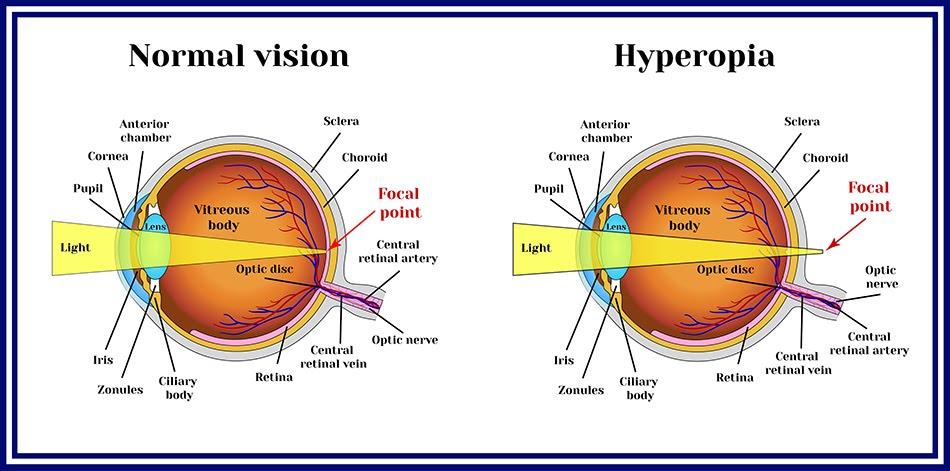Before we get to the question of if we can cure Hyperopia by LASIK, we need to know correctly about ”farsightedness”.
WHAT IS FARSIGHTEDNESS?
Some people see distant objects clearly, while some cannot even see nearby objects. This is a result of defects in the retina of the eye. This is a common eye defect, also known as, Hyperopia, hypermetropia, and long-sightedness.
What happens here is that light rays do not focus on the surface of the retina but behind it. This results in blurry images when perceived. Image formation of nearby objects appears out of focus but objects far away can be seen clearly.
Did you know that some children are born with this condition? This is because their eyeballs are short, so the image is not formed in front of the retina. They outgrow this defect after a while, and the eyeball lengthens with average growth. An increase in the focusing power of the crystalline lens is another reason for Hyperopia and results in the formation of the image behind the retina.
It is important to remember that Hyperopia is an eye defect, not an eye disease. Therefore, it can be corrected. And since the eye’s refractive power is affected by Hyperopia, altering this through surgery is another way to counter the defects. One of the best examples of refractive surgery is LASIK-Laser In-Situ Keratomileusis.
Now, we come back to the question-
CAN WE GET LASIK FOR FARSIGHTEDNESS?
YES, you can get LASIK to cure farsightedness. One of the main benefits of LASIK for farsightedness is that it can eliminate your dependency on corrective lenses or glasses. But you need to be eligible to get the surgery. Certain people should not consider getting LASIK, who are-
- in their early 20s or younger
- pregnant or breastfeeding
- have had a change in vision prescription in the past year
- have fluctuating hormones due to diseases like diabetes
- take certain medications
- have health conditions
- such as autoimmune diseases
- actively participate in contact sports.
Over the past years, there have been significant advancements in the safety, accuracy, and efficiency of LASIK treatment. Study shows that after the treatment, nearly everyone experiences restored vision, and many people have better vision.
However, it doesn’t always correct farsightedness perfectly. As an outcome, you may still have to wear corrective glasses or contact lenses for some activities, such as driving at night.
And like any other surgery, LASIK also has some potential risks and complications–
- Dry eyes
- Glare, halos, and double vision
- Poor night vision
- Infection
- Excess tears
- Abnormal corneal tissue growth
- Vision loss or changes
- Overcorrections because of removing too much tissue
- Astigmatism due to uneven tissue removal
WHAT HAPPENS DURING A LASIK EYE SURGERY?

During LASIK eye surgery, a sterile speculum is positioned under a laser and held open. Many candidates choose to receive an oral sedative to make the process go smoothly and not very stressful. Numbing droplets are applied to the eye. A flap is created over the cornea, exposing the area that needs to be surgically removed. The patient is asked to look at the target light on the laser, and laser pulses are thus applied to the cornea’s peripheral surface. A saline solution is applied that helps remove debris and reposition the corneal flap. The flap is then smoothed, and then the edges are dried. The total time for this surgical treatment is usually less than 30 minutes.
CONCLUSION
Overall, LASIK surgical treatment is a valuable treatment option for Myopia. Still, regression remains a concern due to the cornea’s natural healing response to fill in the ablated tissues, resulting in some loss of efficiency over time.
To find out if LASIK eye surgery may be a useful treatment option for you or not, ask your doctor if you might be a good candidate. Also, it would be best if you were sure to mention any pre-existing medical conditions and any over-the-counter or prescription medications you are taking.

